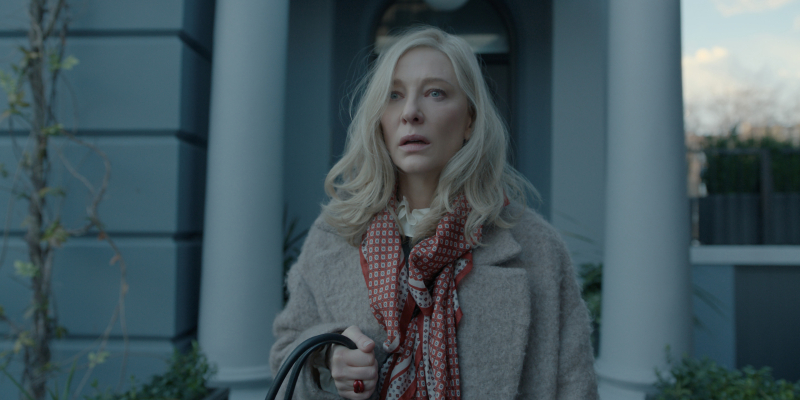
Apple TV+
STREAMING REVIEW | 'DISCLAIMER'
After enjoying a fruitful partnership with Netflix on 2018’s “Roma,” Alfonso Cuarón has doubled down on streaming with a whopping 7-episode miniseries, “Disclaimer,” for rival Apple TV+. It’s of the caliber we’ve come to expect from the Oscar winner’s films. He doesn’t let quality suffer because of quantity here. The series, screening at the Venice Film Festival, more than holds its own against other buzzy world premieres.
A riveting unraveling of a long-buried secret and an unhinged revenge plot, “Disclaimer” has the makings of a conversation piece in the pop-culture discourse. Based on the novel by Renée Knight, the series deftly juggles and crosscuts multiple threads and timelines – the narrative equivalent of he said, she said. Despite a somewhat disorienting premiere, Mr. Cuarón has breathtakingly performed a directorial tightrope act.
The series opens with the hypersexual Jonathan (Louis Partridge) Eurailing with his girlfriend, Sasha (Liv Hill). The deployment of iris shots throughout his particular storyline lets you know that it has been fictionalized within the series’ universe, embellished and, as we’ll find out in due course, weaponized. It’s about to wreak havoc and destroy lives.
Catherine (Cate Blanchett) is a decorated documentarian. You’ve known her kind. You’ve had the misfortune to work with her kind. You’ve probably even been scarred for life by her kind as well. She appears to be such the prototypical heartless go-getter that you have to wonder why Tilda Swinton isn’t playing her. But Lydia Tár will absolutely do! You intrinsically want her to be taken down a peg, and fortunately for you the aforementioned tale about Jonathan promises to do precisely that.
Stephen (Kevin Kline) has no more fucks left to give. When we first meet him, he’s plotting his own firing from a teaching job held for five decades. His beloved wife, Nancy (Lesley Manville), has just died of cancer. Incidentally, she has left behind a novel written in secret titled “The Perfect Stranger.” It’s about her dead son Jonathan – yes, that Jonathan – and implicates Catherine in his drowning decades ago. Nancy has also enclosed nudies and other risqué photographs of Catherine for good measure. These surprise discoveries give Stephen a new purpose in life, which is to ruin hers.
There are two contradicting and conflicting narrators, and you can’t tell which one is unreliable for the most part until the final episode. Long before Catherine insists on telling her side, you have some nagging suspicions about red herrings and what they lead you to think really happened. Which is all well and good, but the series, adapted by Mr. Cuarón, would probably be even more satisfying if it allowed room for ambiguity in the end. As it stands, the conclusion feels ever so generic.
Each of the disparate storylines has a distinct look, yet there is an overall visual cohesion. Jonathan’s fictionalized thread has overtones of golden hues and vibrant reds to signal happier days, while the present-day setting has a steel gray overcast veneer.
The cohesion is due to Mr. Cuarón. Actually, he’s not reinventing the wheel much here, seemingly repurposing his old storyboards. A number of the visuals recall his prior work. “Disclaimer” is thoroughly recognizable as his. The camera getting whiplashed at sea during Jonathan’s drowning instantly brings to mind scenes from “Y tu mamá también” and “Roma.” The vérité handheld camera associated with Robert and scenes on board the public transit recall “Children of Men.” Emmanuel Lubezki and Bruno Delbonnel are in charge of cinematography. The final product fits squarely in Mr. Cuarón’s filmography. Even the shameless placements of Apple products seem exceptionally tasteful.
Ms. Blanchett is dependable as always, but as the earlier “Tár” reference implies, the role is hardly a stretch. Still, this may put her one step closer to EGOT. She codes Catherine as harsh and unlikable, which of course steers viewers toward certain assumptions and allegiances. When the narrative finally affords Catherine the opportunity to come clean, the entire series decides to just go with her account as the gospel truth despite that she’s shown us her manipulative ways much earlier by falsely framing Stephen as a pedophile, which we know for sure but which the series conveniently glosses over in the end.
Mr. Kline has made the most – Brit accent and all – of what seems like the juiciest part he’s landed in years. He has the benefit of being one of the narrators and portraying Stephen two decades apart – as opposed to the younger Catherine being assumed by Leila George and the opposing, voice-of-God narration delivered by Indira Varma. Mr. Kline’s demeanor perfectly conveys his character’s simmering rage, but his scorched-earth voiceover may be even better.
Sacha Baron Cohen benefits from playing against type as Catherine’s meek husband, Robert. Kodi Smit-McPhee, unfortunately, is equally underwhelming here in the role of Catherine and Robert’s son, Nicholas, as he is in another high-profile Venice selection, “Maria.”
Comments